 In recent weeks, the US-China trade war has ratcheted up, with both sides adopting new measures designed to inflict pain on the other’s economy. As US and Chinese leadership attempt to credibly commit to waiting out the other in a bruising economic battle, Thomas Gift explains why China may have the advantage. He argues that Americans are largely unwilling to make the sacrifices necessary to win a protracted trade war.
In recent weeks, the US-China trade war has ratcheted up, with both sides adopting new measures designed to inflict pain on the other’s economy. As US and Chinese leadership attempt to credibly commit to waiting out the other in a bruising economic battle, Thomas Gift explains why China may have the advantage. He argues that Americans are largely unwilling to make the sacrifices necessary to win a protracted trade war.
The US-China trade war is worsening — and fast. Just last week, the Trump administration threatened to impose a new round of 10 percent tariffs aimed at $300 billion worth of Chinese imports. In response, China has allowed its currency to devalue below the key 7 to 1 ratio with the dollar and ended purchases of American agricultural goods. The moves from both sides in no uncertain terms show that Washington and Beijing aren’t afraid to ratchet up tensions in an already bruising economic battle.
But which government can credibly commit to hold out for the long term in this high-stakes game of chicken? It’s now widely believed that any improvements to US-China trade relations will only occur after the next US president is elected in 2020. China ostensibly thinks that it can secure a better deal by waiting out the current administration and hoping a Democrat wins the Oval Office. But that presumes both countries can last that long. The United States might not.
On its face, both governments have reasons to persevere — and also to throw in the towel — before the next US election. Since day one, President Donald Trump has pledged to take on China, and he can’t capitulate without accusations of flip-flopping. The trade war, however, will grow costly. Data suggest that tariffs could effectively leave US households an average of $900 poorer per year — with many Trump supporters being among the hardest hit.
By contrast, President Xi Jinping doesn’t face the same electoral pressures in authoritarian China. Without a democratic constituency to appease, the Chinese state can theoretically wait out the gloom of a trade war indefinitely. Yet amid warnings of global economic cooling, tariffs pose real threats to Chinese GDP growth. Failure to ink a deal could throw the economy into a tailspin, a specter made imminent by the recent rattling of Asian markets.
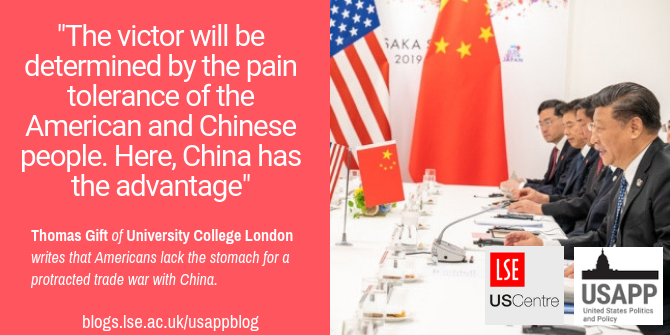
“President Trump at the G20” by The White House is Public Domain.
In the short- to medium-term, both the United States and China will continue to apply pressure to one another. Trump has cautioned that the 10 percent tariffs could balloon to over 25 percent. Meanwhile, China could curb external access to its rare earth supply, which is vital to the global electronics sector. The country could also saddle Chinese-based American firms with burdensome regulations that inflate production costs and undermine profits.
Ultimately, however, which side outlasts the other won’t be decided by toughness on policy. Washington and Beijing have both proven they’re eminently capable of inflicting economic carnage. Instead, the victor will be determined by the pain tolerance of the American and Chinese people. Here, China has the advantage. What’s the tell? Between Trump and Xi, only one isn’t afraid to give his citizens the truth: Winning a trade war won’t just take time – it will take sacrifice.
Consider the rhetoric. Although not referencing the trade war explicitly, Xi this spring called for China to prepare for a “Long March” at precisely the moment of mounting economic tensions with the United States. The phrase alludes to a 4,000-mile trek begun in 1934 by the fleeing Communist Party army, which eventually regained its strength and seized power in China from the Nationalists in 1949. For the Chinese, it’s a legendary tale that evokes glory emerging from suffering.
Contrast that with Trump, who last week tweeted that the trade war was going swimmingly. “Things are going along very well with China,” he proclaimed. “They are paying us Tens of Billions of Dollars…. So far our consumer is paying nothing.” In other words, Americans can have their cake and eat it, too. Trump feeds this fantasy because he knows Americans lack the stomach for anything else — not least a protracted economic clash with China.
Poll numbers confirm this intuition. More Americans think tariffs are a drain than a boost to the economy. And more citizens give Trump a negative than a positive rating on his dealings with China. Against this backdrop, the outcome of the US-China trade war will depend on the readiness of citizens to accept a prolonged streak of unmitigated pain. As one side eats cake, the other preps for a 4,000-mile march. Who’s ready to win the long game?
Please read our comments policy before commenting.
Note: This article gives the views of the author, and not the position of USAPP – American Politics and Policy, nor the London School of Economics.
Shortened URL for this post: http://bit.ly/2ZInrSd
About the author
 Thomas Gift – University College London
Thomas Gift – University College London
Thomas Gift is a Lecturer of Political Science at UCL, where he teaches on Public Policy Economics and Analysis and is the Director of the Philosophy, Politics, and Economics (PPE) Programme.


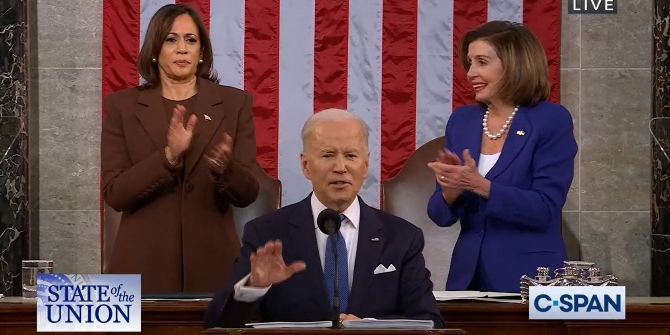
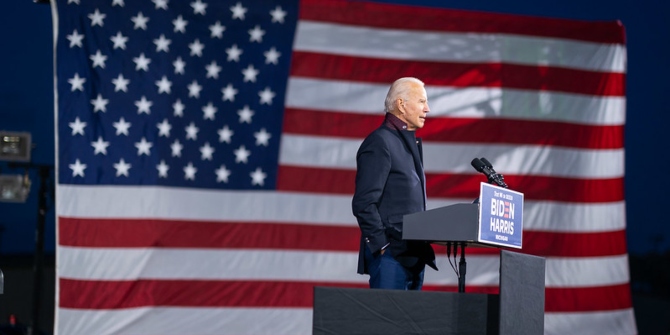
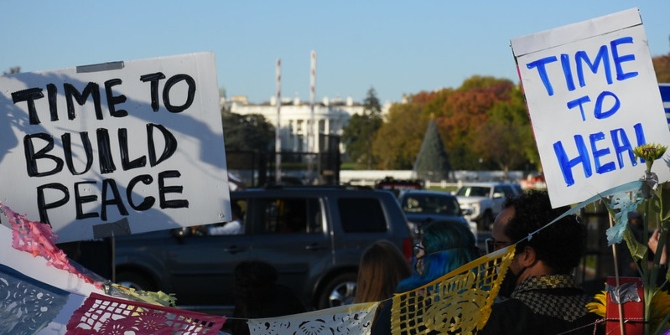
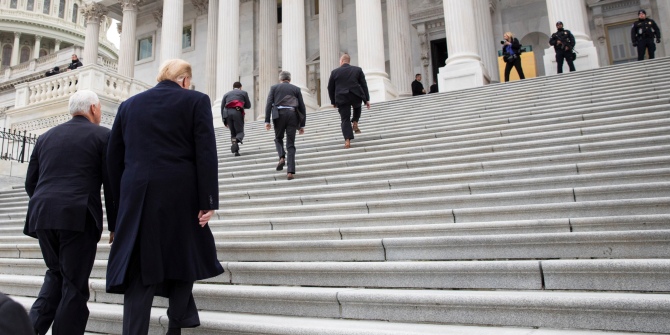

Dear sir
Please explain what is trade war ,and how will sino American trade war will lead to financial upheaval
Thanking you
Pradeep kumar